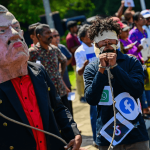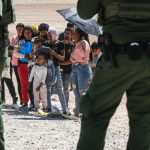
The most recent report sheds light on the tireless challenges confronted by transients and refugees transiting through the dangerous Darién Gap
The most recent report sheds light on the tireless challenges confronted by transients and refugees transiting through the dangerous Darién Gap, crossing over Colombia and Panama. In spite of increased consideration to this issue, the report uncovers critical insufficiencies in the security and help given to these powerless populaces. The 110-page report, titled “Neglected in the Jungle: Inadequate Protection and Assistance for Migrants and Asylum Seekers Crossing the Darién Gap,” underscores the disappointment of Colombian and Panamanian specialists to successfully protect the rights and well-being of vagrants and refugees navigating this misleading territory.
All through the broad interviews, it became apparent that fundamental security measures are prone to basic administrations, and responsibility for crimes against transients, especially cases of sexual savagery, were seriously missing. In spite of the nearness of universal and territorial legitimate systems pointed at ensuring migrants’ rights, counting the rights of children and refugees, execution at the ground level has been lacking. This disappointment compromises the security and nobility of transients and refuge searchers but moreover undermines the rule of law and human rights standards within the locale.
Suspension of Médecins Sans Frontières’ (MSF) Work
The suspension of Médecins Sans Frontières’ (MSF) operations by the Panamanian government advances the critical circumstance confronted by vagrants and refugees within the Darién Gap. MSF, eminent for its humanitarian efforts around the world, played an urgent part in giving basic help to vagrants, counting therapeutic care and support for survivors of sexual savagery. The unexpected suspension of MSF’s exercises, credited to the termination of an ascension between the organization and the Panamanian government, has cleared out a critical void in humanitarian help arrangement in the locale. This choice has raised concerns among human rights advocates and compassionate organizations with respect to the welfare of transients and refugees, especially within the nonattendance of elective support instruments.
Heightening Relocation Numbers and Dangers
The tireless stream of transients and refugees through the Darién Gap endures in spite of the imposing dangers posed by the tough landscape, unforgiving climate conditions, and the nearness of equipped bunches. The number of people undertaking this dangerous journey, counting a significant extent of children, has been steadily expanding, with projections demonstrating a surge in 2024. This convergence underscores the critical requirement for improved security and help measures to moderate the dangers confronted by transients and refugees. Appallingly, numerous people have misplaced their lives or gone lost amid the strenuous journey, underscoring the criticalness of addressing the root causes of constrained relocation and moving forward compassionate reactions to migration flows.
Call for Facilitated Territorial Reaction and Approach Inversions
In response to the multifaceted challenges postured by relocation through the Darién Gap, a facilitated territorial reaction is called for nations including both Colombia and Panama, as well as broader universal participation. Particular suggestions include the arrangement of extraordinary counsels or senior authorities entrusted with planning endeavors to address migration-related challenges, supporting participation with helpful organizations and nearby communities, and fortifying measures to avoid and explore crimes against vagrants, especially cases of sexual violences.
Furthermore, the report emphasizes the significance of turning around approaches that compel people to embrace unsafe intersections just like the Darién Gap and receiving rights-respecting approaches that maintain refugees’ rights in agreement with universal benchmarks. This incorporates honoring the 40th commemoration of the 1984 Cartagena Declaration, a point of interest universal instrument on refugees’ rights in Latin America, by embracing approaches that prioritize assurance, help and regard for the respect of all vagrants and refugees. By tending to the basic variables driving constrained relocation and making strides helpful reactions, governments can work towards guaranteeing that people are not constrained to risk their lives in regard to security and respect.







